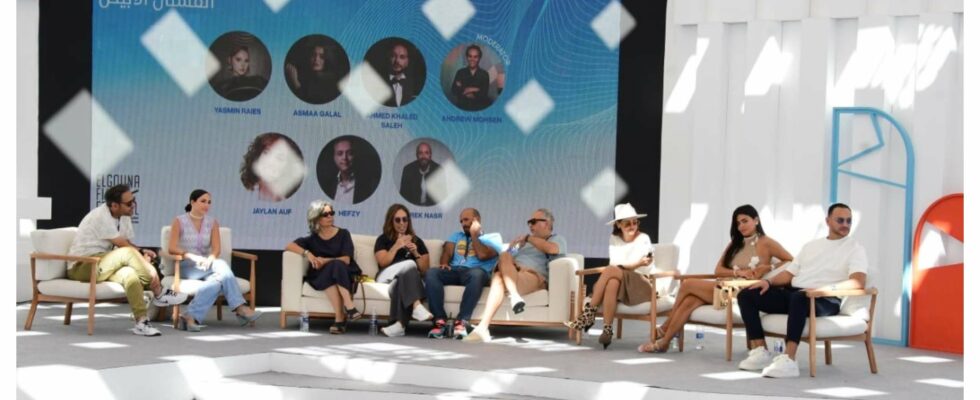La septième édition du Festival du Film d’El Gouna a marqué un retour à la stabilité après des perturbations dues à des conflits régionaux. Du 24 octobre au 1er novembre, le festival a réuni un large public et des acteurs clés, avec un accent sur la solidarité et l’avenir du cinéma au Moyen-Orient. Des discussions ont eu lieu sur les conflits en cours, en particulier en Palestine, tandis que la diversité dans la production cinématographique régionale a été encouragée. L’Arabie saoudite émerge comme un nouveau centre de financement et de production cinématographique.
The seventh edition of the El Gouna Film Festival marked a return to stability after the cancellation of the 2022 edition for a « reset » and the delayed scheduling of last year’s festival from October to December owing to the war in Gaza. This year’s event, which ran from October 24 to November 1 in the Egyptian resort destination, attracted enthusiastic audiences and significant figures from both regional and international cinema as part of the market platform CineGouna.
Artistic director Marianne Khoury remarked, “The program was always strong, but the media focused primarily on the glamour and red carpet.” She continued, “When I joined last year, my aim was to offer a better balance in the coverage across all programs, not just the glamorous aspects.”
This year’s festival embodied that intent, as filmmakers and industry leaders remained acutely aware of the ongoing conflicts in the Middle East, including the proximity of the war in Palestine. Panels emphasized themes of collaboration and solidarity, with speakers proposing solutions and discussing the future of cinema in the Middle East and North Africa.
Filmmaking and Palestine in Times of Conflict at the Festival’s Core
Gouna revived its Window on Palestine initiative this year, which was launched in response to rising tensions in 2023. Beyond discussions focused on Palestine, the festival also facilitated dialogues on other regional conflicts, including those in Lebanon, Yemen, and Sudan.
Khoury expressed, “You cannot host a festival in this region and ignore global events.” Jordanian producer Rula Nasser added, “I might not understand the Sudanese dialect, but I am deeply affected by the events occurring there. We live in an era of real-time news. It doesn’t matter where we come from; we are equal. If there is an issue, we must listen.”
Palestinian filmmakers highlighted the importance of elevating Palestinian voices while acknowledging the immense pressure they face—alongside other Middle Eastern and North African creatives—to swiftly respond to the war and articulate their communities’ struggles through film.
“I want to write something about Gaza, but it’s challenging since it is the place of my birth and upbringing,” stated Mohammed Almughanni, director of “An Orange From Jaffa.” “I need some emotional distance to effectively write about it. It took filmmakers twenty years to create films about World War II to process the events.”
Embracing Commercial and Genre Films
Industry leaders frequently pointed out that the Western world still holds a specific perception of what constitutes an Arab film, which places local directors at a disadvantage.
Prominent producer and CEO of Egypt’s Film Clinic, Mohamed Hefzy, referred to the expectations facing MENA films as “unjust.” He mentioned, “We often hear that our films are excellent, yet the story could occur anywhere. There seems to be an unspoken expectation that narratives from our region must be uniquely tied to it. We hope to be evaluated based on the films themselves, but that remains a challenge.”
Creator of “The Red Sea Makes Me Wanna Cry,” Faris Alrjoob, underscored the need for attractive projects, stating, “If stakeholders are investing, it’s because they expect a return—ideally more than they invested. We should not limit ourselves to creating films deemed ethically necessary. The majority of Arabian films tackle social issues, but diversifying our storytelling is essential for a sustainable industry. Quality commercial films can still offer serious narratives.”
Alaa Karkouti, producer and CEO of MAD Solutions, noted the unique response to “Thanks for Banking With Us!” describing it as an unusually uplifting Palestinian film.
Saudi Arabia in the Spotlight
Thanks to the establishment of the Red Sea Fund—designed to foster and support MENA talent—filmmakers have increasingly turned to Saudi Arabia for funding over the past five years. The Red Sea Film Festival and Red Sea Souk have emerged as valuable platforms for directors to present their work and network.
“This is a significant opportunity for us. We’ve had five films funded in the past year and a half,” Hefzy shared, with director Laila Abbas from “Thanks for Banking With Us!” noting that “Saudi is the newcomer on the scene, so it’s natural that many filmmakers are seizing the opportunities available there.”
Emad Eskander, head of the Red Sea Fund, discussed the synergy between Egypt and Saudi Arabia, as well as the influence of Egyptian cinema on Saudi culture. “There’s a historical connection because Egyptian stories have resonated for so long. The Egyptian dialect is also widely understood in
